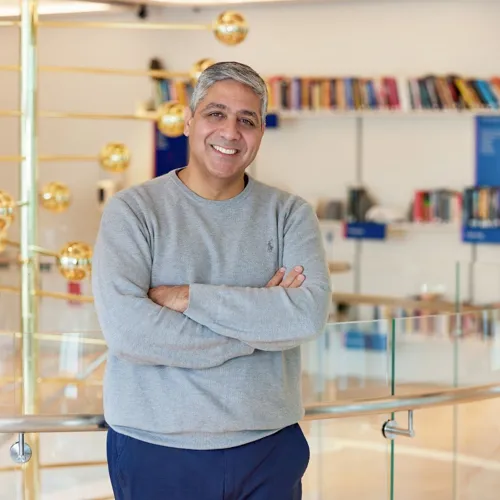Google's AI Ambitions Crystallize with New Chief Architect Role
Google has elevated DeepMind CTO Koray Kavukcuoglu to the newly created position of Chief AI Architect. The appointment, revealed in an internal memo from CEO Sundar Pichai, places Kavukcuoglu at the nexus of Google's sprawling AI empire with a clear mandate: transform the company's world-class research into market-defining products before competitors can capitalize on the AI revolution.

From Aerospace to AI Kingmaker
The Turkish-born Kavukcuoglu brings a unique background to his expanded role. Originally trained as an aerospace engineer before earning his PhD in computer science under AI pioneer Yann LeCun at NYU, Kavukcuoglu joined DeepMind as a researcher in 2012, well before Google's 2014 acquisition of the London-based AI lab. His ascension through the ranks has coincided with DeepMind's emergence as a powerhouse in fundamental AI research.
"This appointment recognizes what many inside Google have understood for years—Kavukcuoglu has been instrumental in positioning DeepMind at the forefront of AI benchmarks, particularly in language understanding and multimodal reasoning," noted a senior AI researcher who requested anonymity due to professional relationships with the company.
Under Kavukcuoglu's technical leadership, DeepMind developed the Gemini family of models, now widely regarded among the industry's most capable large language models. His team's work has increasingly focused on bridging theoretical capabilities with practical applications, laying groundwork for products like NotebookLM, Project Mariner (for autonomous browser control), and Astra (for physical world understanding).
The Silicon Valley Homecoming
As part of this expanded mandate, Kavukcuoglu will relocate from London to Mountain View—a symbolic move underlining Google's commitment to tightening the feedback loop between research innovation and product deployment. While retaining his CTO responsibilities at DeepMind, he will now report directly to Pichai as a Senior Vice President, placing him firmly in Google's upper echelon of decision makers.
The creation of this role comes amid a broader restructuring that has seen the merger of DeepMind and Google Brain, alongside other leadership reshuffles designed to accelerate product development cycles. Industry observers see these moves as a direct response to mounting pressure from rivals like OpenAI and Microsoft, whose collaborative efforts have rapidly advanced consumer-facing AI tools.
The Productization Problem
Google's challenges translating its research prowess into compelling products have become increasingly apparent. Despite leading on technical benchmarks, the company has struggled to match the market impact of competitors who move with greater agility.
"Google's problem has never been innovation—it's been productization," explained a former Google executive who now advises AI startups. "They have world-class research, but turning those capabilities into features users love has been their Achilles' heel. Kavukcuoglu's appointment is tacit acknowledgment of this gap."
This tension is reflected in recent high-profile AI features for Google Search and Assistant that industry analysts describe as underwhelming compared to the capabilities demonstrated in research settings. The new role effectively centralizes oversight of AI-powered product development while streamlining decision-making across what has become an increasingly complex organizational structure.
Talent Troubles and Non-Compete Controversies
Kavukcuoglu's elevation comes against a backdrop of controversy surrounding DeepMind's approach to talent retention. Under the senior leadership team including Kavukcuoglu, DeepMind has enforced UK-style non-compete clauses and extended notice periods that former director Nando de Freitas publicly criticized as "stifling innovation" and "sidelining AI developers for up to a year."
These policies have reportedly strained relations with UK-based AI staff, with multiple sources confirming talent departures and discontent among remaining team members. While no personal misconduct allegations have been directed at Kavukcuoglu himself, these organizational policies represent a potential liability as he assumes broader leadership responsibilities.
The AI Arms Race Intensifies
Google's reshuffling comes amid an increasingly competitive landscape where AI capabilities have become central to tech companies' market valuations and future prospects. The appointment signals Google's determination to maintain its research edge while accelerating the pace at which innovations reach consumers.
"This is the clearest indication yet that Google sees AI not just as a research domain but as the core of its future business model," observed a technology strategist at a major investment firm. "By creating this role, they're acknowledging that the company that wins in AI will be the one that can most effectively turn breakthroughs into products people actually use."
Investment Outlook: Potential Winners and Watchpoints
For investors monitoring the AI space, Google's organizational changes suggest several potential opportunities. The formalization of AI product development under Kavukcuoglu may accelerate integration of advanced capabilities into Google's core advertising and cloud businesses—areas that could see margin expansion if AI features drive increased engagement and enterprise adoption.
The appointment may also signal increased investment in hardware designed to showcase Google's AI capabilities. Companies in Google's supply chain, particularly those providing specialized components for AI processing, could benefit from accelerated product cycles.
Market analysts suggest watching for early indicators of success in Kavukcuoglu's new role, including consumer reception of upcoming AI features in Search and Assistant, enterprise adoption metrics for Google Cloud's AI offerings, and talent retention rates at DeepMind's London headquarters.
"The company that most effectively bridges research and product in AI stands to capture tremendous value," notes a portfolio manager specializing in technology investments. "If Kavukcuoglu can solve Google's productization problem, the upside could be substantial—but execution remains the key question."
Disclaimer: This analysis reflects current market conditions and publicly available information. Past performance does not guarantee future results. Readers should consult financial advisors for personalized investment guidance.
